|
|
|
Sort Order |
|
|
|
Items / Page
|
|
|
|
|
|
|
| Srl | Item |
| 1 |
ID:
088474
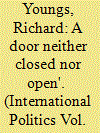

|
|
|
|
|
| Publication |
2009.
|
| Summary/Abstract |
Ukraine provides evidence of very different Common Foreign and Security Policy negotiating dynamics. In the run up to the country's Orange Revolution, significant differences persisted between member states over how the European Union (EU) should support Ukraine's democratic transition. A combination of normative entrapment and co-operative bargaining ensured that 'maximalist' and 'minimalist' member states united around a common position in support of the Orange Revolution. In subsequent debates over whether the EU should offer Ukraine a membership prospect, however, lowest common denominator dynamics prevailed. This case additionally demonstrates that both before and after Ukraine's democratic transition very specific external geostrategic factors played an important role in conditioning EU policy outcomes
|
|
|
|
|
|
|
|
|
|
|
|
|
|
|
|
| 2 |
ID:
174920


|
|
|
| 3 |
ID:
085514


|
|
|
|
|
| Publication |
2008.
|
| Summary/Abstract |
The majority of the literature examining the European Union's ability to encourage political and economic reform only considers its influence in countries involved in the accession process; few have examined its impact in non -accession countries. Therefore in this paper I assess the ability of the EU to promote reform outside of the accession process and develop a theory explaining a state's compliance with or rejection of EU pressure to reform. Through comparing and contrasting the cases of Belarus and Ukraine, I determine that a combination of domestic elite preferences and the strength of EU pressure - a function of the degree of unity among the EU members on the issue - influence the likelihood of a state's c
|
|
|
|
|
|
|
|
|
|
|
|
|
|
|
|
| 4 |
ID:
108206
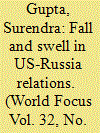

|
|
|
| 5 |
ID:
123254


|
|
|
| 6 |
ID:
080755
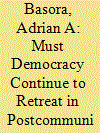

|
|
|
|
|
| Publication |
2008.
|
| Summary/Abstract |
In late 2004, Ukraine's Orange Revolution appeared to herald a second wave of democratic transformation destined to sweep through much of postcommunist Europe and Eurasia. Now, only three years later, this wave has dissipated. Some analysts see democracy as being in retreat and they view the lessons of 1989-2004 as no longer applicable. This article posits that democratic progress is, in fact, still achievable in many former communist countries, and that a look at recent history provides important perspectives towards that goal. However, both the region's reform leaders and Western policy makers must also take full account of the new "post-postcommunist" paradigm. This paradigm is characterized by Russia's negative and increasing influence, the European Union's "expansion fatigue," the waning of U.S. democracy-promotion efforts and credibility, and some degree of democratic disillusionment. With re-invigorated and more united efforts, the impressive post-1989 gains in democratization can be consolidated and new momentum built towards the goal of "a Europe whole and free."
|
|
|
|
|
|
|
|
|
|
|
|
|
|
|
|
| 7 |
ID:
082093
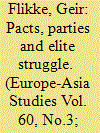

|
|
|
|
|
| Publication |
2008.
|
| Summary/Abstract |
This article resuscitates some of the theoretical arguments of transition studies to shed light on the complex institutional and political developments in post-Orange Ukraine (2004 - 2007). In December 2004, Ukraine's elite agreed to embark on a complex transition involving power-sharing between the Rada (parliament) and the government on one side, and the presidency on the other. The new electoral law was to be based on a fully proportional system. In the subsequent period of 2005 - 2007, two consecutive proportional elections have been held, Ukraine has had several governments, and the Rada was incapacitated for a longer period. Rival elites engaged in a zero-sum game over reforms, and attempts were made to resolve differences by several pacts. This article analyses the post-Orange transition in terms of three variables: the effectiveness of pacts, the need to abide by the transition scheme, and the effect of elections. It is argued that Ukraine has failed to deliver on pacts and timetables, but has delivered on elections. This means that its political system may be considered a minimalist and electoral based one
|
|
|
|
|
|
|
|
|
|
|
|
|
|
|
|
| 8 |
ID:
079725


|
|
|
|
|
| Publication |
2007.
|
| Summary/Abstract |
Since the 'Orange Revolution' Ukraine has been engaged in a comprehensive programme of naval transformation aimed at building an effective coastal defence navy able to protect its maritime interests in the Black Sea: an efficient and well run Ukrainian coastal navy that is inherently defensive in orientation can maintain good order at sea and protect Ukraine's security and can also make an important contribution to regional security and stability. Over the last few years Ukraine has been making steady progress in developing a balanced, flexible and deployable coastal navy able to engage in a full spectrum of defence activities. However, continued progress is likely to be hampered in the medium term by the high cost of naval transformation, the challenges of democratic consolidation and friction between Russia and Ukraine in the Black Sea
|
|
|
|
|
|
|
|
|
|
|
|
|
|
|
|
| 9 |
ID:
127817
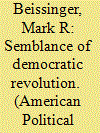

|
|
|
|
|
| Publication |
2013.
|
| Summary/Abstract |
Using two unusual surveys, this study analyzes participation in the 2004 Orange Revolution in Ukraine, comparing participants with revolution supporters, opponents, counter-revolutionaries, and the apathetic/inactive. As the analysis shows, most revolutionaries were weakly committed to the revolution's democratic master narrative, and the revolution's spectacular mobilizational success was largely due to its mobilization of cultural cleavages and symbolic capital to construct a negative coalition across diverse policy groupings. A contrast is drawn between urban civic revolutions like the Orange Revolution and protracted peasant revolutions. The strategies associated with these revolutionary models affect the roles of revolutionary organization and selective incentives and the character of revolutionary coalitions. As the comparison suggests, postrevolutionary instability may be built into urban civic revolutions due to their reliance on a rapidly convened negative coalition of hundreds of thousands, distinguished by fractured elites, lack of consensus over fundamental policy issues, and weak commitment to democratic ends.
|
|
|
|
|
|
|
|
|
|
|
|
|
|
|
|
| 10 |
ID:
080678
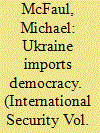

|
|
|
|
|
| Publication |
2007.
|
| Summary/Abstract |
Can the West promote democracy? An examination of one critical case, the 2004 Orange Revolution in Ukraine, offers a unique method for generating answers to this important theoretical and policy question. Tracing the causal impact of external influences first requires a theory of democratization composed exclusively of domestic factors, specifically the changing distribution of power between the autocratic regime and democratic challengers. Once these internal factors have been identified, the extent to which external factors influenced either the strength of the autocratic regime or the democratic challengers can be measured. Domestic factors accounted for most of the drama of the Orange Revolution, but external factors did play a direct, causal role in constraining some dimensions of autocratic power and enhancing some dimensions of the opposition's power. International assistance in the form of ideas and financial resources was crucial to only one dimension of the Orange Revolution: exposing fraud. Yet significant international inputs also can be identified regarding the preservation of semi-autocracy, the nurturing of an effective political opposition, the development of independent media, and the capacity to mobilize protesters after the falsified presidential vote.
|
|
|
|
|
|
|
|
|
|
|
|
|
|
|
|
|
|
|
|
|